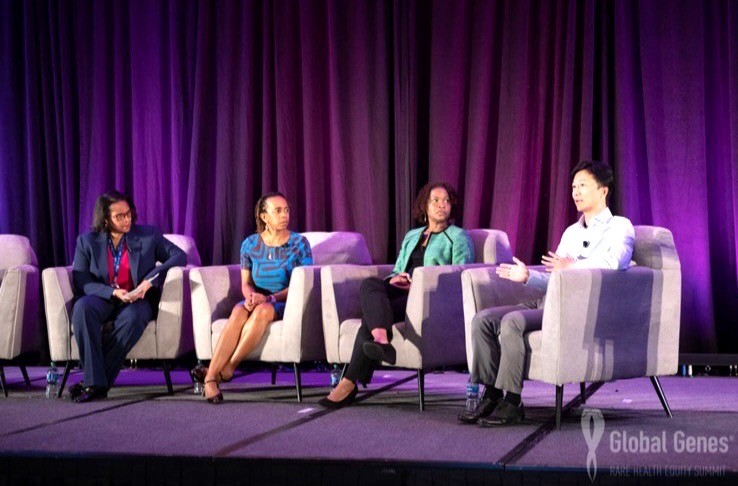I had the pleasure of joining the PCC Global Institute LLC and Rare Disease Diversity Coalition Rare Health Equity Summit in November of 2022. Delighted to host a panel of leaders in science from different sectors, leading a conversation about rare diseases and the role that testing plays in conquering them.
The panel (pictured above) did a fantastic job of helping us all talk about how testing eludes us and how we can overcome it. Barbara Harrison, MS, CGC, Genetic Counselor and Assistant Professor, Howard University, underscored the role of the genetic counselor and is working to ensure we are building the profession with historically excluded people. Patients need to see themselves in the practitioners supporting them. Ebony Madden, MS, Ph.D., Program Director, Training, Diversity and Health Equity Office, National Human Genome Research Institute (NHGRI), discussed access- or lack thereof. She emphasized our need to provide access to rural communities, as well as to find ways to include people who don’t have time to take off to go to providers. Dr. Madden stressed the need for providers to find a way to come to those potential participants. The path to success in creating diversity in genetic testing is lined with well-funded trials focusing on this inclusion.
Zhanzhi H., Ph.D., (Mike), Co-Founder and President of Project GUARDIAN, rounded out the Rare Health Equity Summit’s panel. Mike explained how some parents’ fear of guilt is associated with their decision to participate. If they believe that the outcome of their test might reveal where genetic differences originated, they often shy away from the idea. Mike helped us understand there is no such thing as a perfect genome: we are all passing along the good, as well as any differences. There’s no need to fear or succumb to guilt around this.
This phenomenal panel provided a great deal of awareness of the barriers to achieving diversity in genetic testing, including awareness, physical and practical access, and emotional readiness. But, perhaps what impacted me most was a discussion with a man who suffered from a rare disease that went misdiagnosed for years. Because his symptoms were not socially acceptable, he was mistaken as a criminal instead of a person needing treatment. Finally, with a diagnosis and treatment, he has regained some of his life back. He is managing, but he has since lost the career he enjoyed at the onset of his disease. I am deeply compelled as I know there are so many more currently sitting in jail cells, misdiagnosed or lacking the resources to get any proper diagnosis. My heart breaks when I consider there may be little chance of getting real help.
This conference was so powerful in bringing together different parts of the community for discourse on defining the problem and exploring solutions. Hearing from the experts in the science community was empowering. Even more impactful was hearing directly from the mouths of people who are suffering and/or have suffered from rare diseases. It undoubtedly leaves you changed.
Today is Rare Disease Day, a global day of awareness for the 300 million people living with a rare disease, as well as their families and caretakers. This year’s theme, “Share Your Colours,” is an invitation to share our stories and experiences to change and improve the lives of this vulnerable population worldwide.
Click here to learn more about four patient organizations spotlighted by Illumina and our acceleration of Illumina iHope with the announcement of IHope China! I am certainly #IlluminaProud to report that iHope has facilitated pro bono genetics testing to 1700 children across eight countries.
Collectively, let’s move forward and spread awareness by talking about rare disease – how it shows up in our families and our communities. Let’s start sharing insights and resources. As we know more, we can do more. Each time we help one person, we move forward and become more equitable in our practice.
Dr. Lisa

